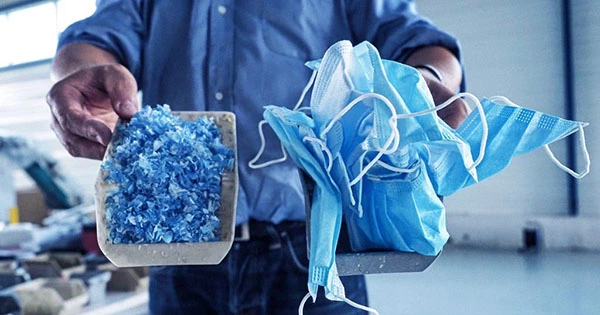Along with a catastrophic loss of human life, the pandemic has resulted in a waste catastrophe of a different kind: all the disposable masks, gloves, and other personal protective equipment. One group has proposed a solution, having discovered a way to recycle surgical masks into something that addresses a much larger issue: climate change. Waste surgical masks were disinfected and dipped in graphene ink by Professor Anvar Zakhidov of Russia’s National University of Science and Technology with researchers from three Mexican institutions.
The masks were subsequently heat-processed into electrodes, and the mask material was used as a separating material in the production of supercapacitors. In the Journal of Energy Storage, they explain the production process and performance measures.
Supercapacitors work in a different way than ordinary batteries, but they do the same thing: they store electricity for later use. Zakhidov offers uses in the home, such as clocks and lamps, but if the concept is scaled up, it might enable solar and wind power supplant fossil fuels. “The material is pressed…and heated to 140°C,” Zakhidov said in a release. “Conventional supercapacitor batteries require very high temperatures for pyrolysis-carbonation, up to 1,000-1,300°C [1,800-2,400°F], while the new approach cuts energy usage by a factor of ten.
The product has the potential to be extremely inexpensive due to a nearly limitless supply of raw ingredients and low processing energy requirements. Furthermore, Zakhidov and co-authors say that their product has an energy storage density nearly ten times that of rival technology, making it commercially viable. By adding Ca3Co4O9- oxide nanoparticles, the researchers was able to more than double their previous energy density record to 208 watt hours per kilogram.
Although the comparison is flawed because automobile batteries require additional packing, this is denser than ordinary electric car batteries. Zakhidov’s team enclosed its product in protective shells manufactured from discarded blister packs, which are commonly used to store drugs.
Their product, like other supercapacitors, can swiftly release energy, providing it an advantage over many other energy storage technologies. Because battery producers are eagerly seeking substitutes for the precious metal, whose manufacturing is beset by human rights violations, the fact that the highest performance requires cobalt could be an impediment to mass production. Even if no substitute can be obtained, the cobalt-free version is thick enough for some applications.
The idea of turning face masks into energy storage devices may sound strange, but various porous materials, such as discarded vehicle tires and coconut shells, have been studied for this purpose. Although they typically operate, they usually necessitate processing at a high temperature. Zakhidov has not stated whether N95s are as effective at storing energy as they are at keeping viruses out when compared to regular masks.
















